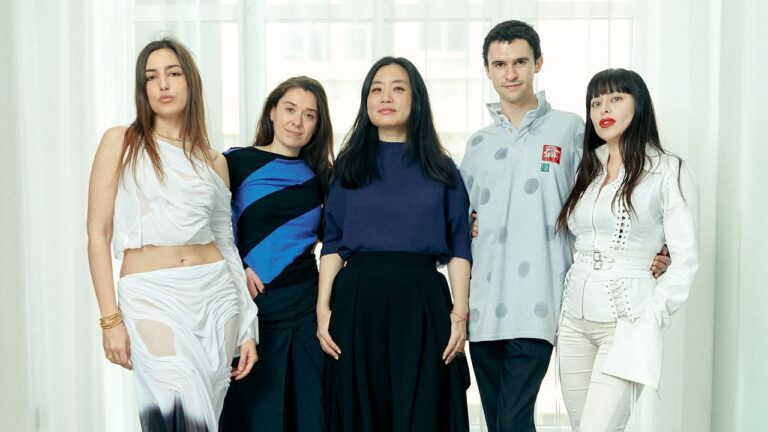The bubbling excitement, however, doesn’t distract from the significance of the task at hand: to convince a panel that includes the likes of outgoing BFC chair Caroline Rush, incoming chair Laura Weir, British Vogue contributing fashion editor Harry Lambert, and British Vogue’s own Chioma Nnadi, Laura Ingham and Julia Hobbs why their burgeoning businesses represent compelling cases for significant investment. “Being on the panel is never an easy task, and each of this year’s candidates was so different from the next, presenting really different proposals for what they would do with the prize money,” says British Vogue contributing editor Alexa Chung. “And moreover, they were each so compelling, which has made the choice a very difficult one in the end.”
The weight of the responsibility is only accentuated by the notoriously hostile climate that today’s independent Britain-based designers face. “It’s obviously such an honour to be part of the panel, but, more than just an exciting moment, it’s also an opportunity to really hear from designers – to hear the challenges they face and to understand what it means to run a business today,” says Nnadi, British Vogue’s head of editorial content. “You only have to look at the news to know how difficult it is at the moment. That makes these kinds of initiatives invaluable, offering a lifeline to designers – not just through investment, but also mentorship and a spotlight.”
So, what of the premises of the designers’ pitches for this lucrative opportunity? For Dimitra Petsa, the founding creative director of Di Petsa, it was all about highlighting the significant efforts that her brand has made to establish itself as an industry-wide champion of diversity. “It’s an ethos that’s really at the heart of the business – we work on a made-to-order basis, eliminating barriers with sizing. I also explained how, if I were to win the prize, I would expand on our menswear, which we debuted last season.”
Dilara Findikoğlu spotlit her intentions to funnel the investment into the expansion of her existing operation, as well as into a number of top secret projects currently in the works, while Edeline Lee, a designer who, over the past decade, has built a business with a fully integrated production infrastructure, highlighted how the fund would facilitate the expansion of its direct-to-consumer operations.
For Byre and Ives, their intentions were to distribute the funds across the breadth of their businesses. “I wanted to get across our key challenges at the moment, which are mostly centred around production, product and marketing and reach,” noted Byre, a sentiment echoed by Ives: “I applied for the fund on the basis of investing in the most lucrative parts of the business: our e-comm, but also our private client and demi-couture business. I wanted to highlight that this money would help us to grow, but also just to do our jobs better, which is going to be essential going forward.”


